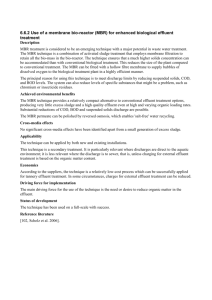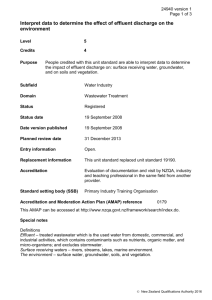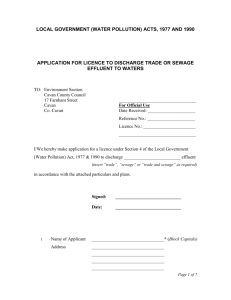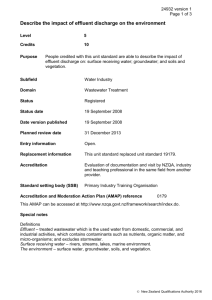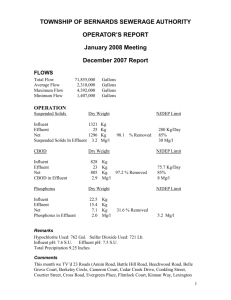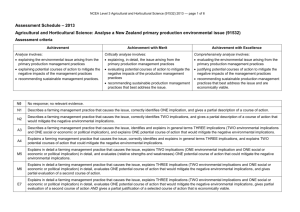Feedback draft plan Taranaki June 15
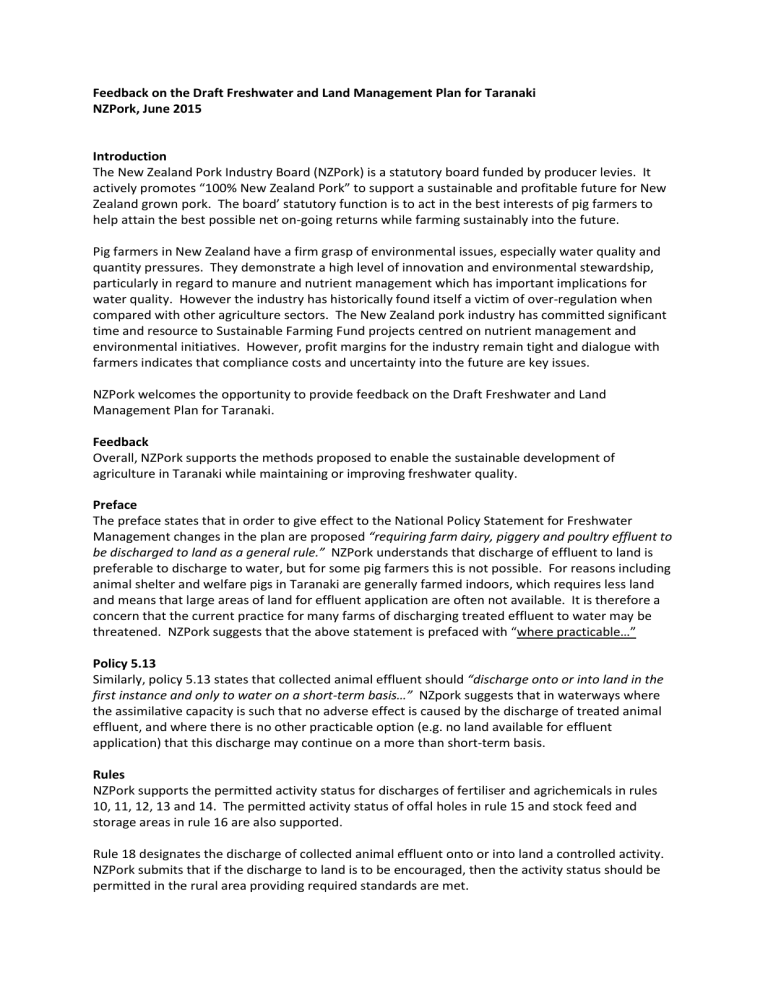
Feedback on the Draft Freshwater and Land Management Plan for Taranaki
NZPork, June 2015
Introduction
The New Zealand Pork Industry Board (NZPork) is a statutory board funded by producer levies. It actively promotes “100% New Zealand Pork” to support a sustainable and profitable future for New
Zealand grown pork. The board’ statutory function is to act in the best interests of pig farmers to help attain the best possible net on-going returns while farming sustainably into the future.
Pig farmers in New Zealand have a firm grasp of environmental issues, especially water quality and quantity pressures. They demonstrate a high level of innovation and environmental stewardship, particularly in regard to manure and nutrient management which has important implications for water quality. However the industry has historically found itself a victim of over-regulation when compared with other agriculture sectors. The New Zealand pork industry has committed significant time and resource to Sustainable Farming Fund projects centred on nutrient management and environmental initiatives. However, profit margins for the industry remain tight and dialogue with farmers indicates that compliance costs and uncertainty into the future are key issues.
NZPork welcomes the opportunity to provide feedback on the Draft Freshwater and Land
Management Plan for Taranaki.
Feedback
Overall, NZPork supports the methods proposed to enable the sustainable development of agriculture in Taranaki while maintaining or improving freshwater quality.
Preface
The preface states that in order to give effect to the National Policy Statement for Freshwater
Management changes in the plan are proposed “requiring farm dairy, piggery and poultry effluent to
be discharged to land as a general rule.” NZPork understands that discharge of effluent to land is preferable to discharge to water, but for some pig farmers this is not possible. For reasons including animal shelter and welfare pigs in Taranaki are generally farmed indoors, which requires less land and means that large areas of land for effluent application are often not available. It is therefore a concern that the current practice for many farms of discharging treated effluent to water may be threatened. NZPork suggests that the above statement is prefaced with “where practicable…”
Policy 5.13
Similarly, policy 5.13 states that collected animal effluent should “discharge onto or into land in the
first instance and only to water on a short-term basis…” NZpork suggests that in waterways where the assimilative capacity is such that no adverse effect is caused by the discharge of treated animal effluent, and where there is no other practicable option (e.g. no land available for effluent application) that this discharge may continue on a more than short-term basis.
Rules
NZPork supports the permitted activity status for discharges of fertiliser and agrichemicals in rules
10, 11, 12, 13 and 14. The permitted activity status of offal holes in rule 15 and stock feed and storage areas in rule 16 are also supported.
Rule 18 designates the discharge of collected animal effluent onto or into land a controlled activity.
NZPork submits that if the discharge to land is to be encouraged, then the activity status should be permitted in the rural area providing required standards are met.
Definitions
A new definition for “Intensive Pastoral Farming” is included. This definition excludes, among others, “intensive pig farming”, however no definition of intensive pig farming is given in the draft plan. If a definition of “Intensive Pig Farming” were to be added, NZPork would be grateful to be consulted regarding possible wording.
General
As previously mentioned, continually rising compliance costs are a major concern for pig farmers, who face a number of economic, social and environmental challenges in order to remain viable. The contribution of imported pork to NZ’s total pork consumption has increased significantly in recent years, placing further demands on producers. Given the strong history of good water quality and the improvements drafted, NZPork suggests that an audit regime to reduce ongoing compliance monitoring costs would be appropriate. The implementation of a new plan for the region presents an opportunity to develop smarter and more efficient compliance monitoring systems.
NZPork is also concerned about the amount of food waste currently being dumped in Taranaki and strongly supports some incentives from local government for industries to re-use by-products. Many of the waste dumped from food producers in the region could be instead used as pig food.

